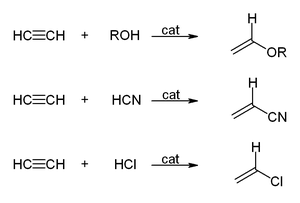Vinylation
In organic chemistry, vinylation is the process of attaching a vinyl group (CH2=CH−) to a substrate. Many organic compounds contain vinyl groups, so the process has attracted significant interest, especially since the reaction scope includes substituted vinyl groups. The reactions can be classified according to the source of the vinyl group.
Nucleophilic vinyl reagents
Vinyl lithium and vinyl magnesium bromide are sources of "CH2=CH−", which add to ketones and aldehydes.[1]
Vinylsiloxane[2] and vinylboranes[3] have also been used as sources of vinyl anion equivalents.These types of reactions require catalysts such as those based on palladium.
Vinylation with alkenes
The Heck reaction couples an unsaturated halide with an alkene. Base and a palladium catalyst are required. This reaction is a way to substitute alkenes.[4][5]

Vinylation with acetylene
As originally developed by Walter Reppe, acetylene participates in a variety of metal- or base-catalyzed reaction to afford vinyl derivatives.[6][7] Alcohols, thiols, and secondary amines add to acetylene to give the vinyl ethers, vinyl sulfides, and vinyl amines, respectively.[8]
In the presence of metal catalysts, carbon monoxide and acetylene react to give acrylic acid or acrylic esters. The net reaction is vinylation of carbon monoxide.[9]
Vinyl acetate
The preparation of vinyl esters typically requires indirect methods because vinyl alcohol is not a suitable reagent. Vinyl acetate, which is available on an industrial scale, can be used to produce other vinyl esters. The process is sometimes referred to as transvinylation.[10] Higher esters of vinyl acetate have been used in the synthesis of vinyl formate.
Alternatively, vinyl ethers can be prepared from alcohols by iridium-catalyzed transesterification of vinyl esters, especially the widely available vinyl acetate:[11]
- ROH + CH2=CHOAc → ROCH=CH2 + HOAc
See also
- Hydrovinylation, ethylene adds "across" an alkene double bond
References
- ^ Hamilton, James; Sarlah, David; Carreira, Erick M. (2015). "Iridium-Catalyzed Enantioselective Allylic Vinylation with Potassium Alkenyltrifluoroborates". Organic Syntheses. 92: 1–12. doi:10.15227/orgsyn.092.0001.
- ^ Scott E. Denmark, Christopher R. Butler (2009). "Vinylation with Inexpensive Silicon-Based Reagents: Preparation of 3-Vinylquinoline and 4-Vinylbenzophenone". Organic Syntheses. 86: 274. doi:10.15227/orgsyn.086.0274.
- ^ Donal F. O'Shea (2012). "Discussion Addendum for: Suzuki-Miyaura Cross-Coupling: Preparation of 2'-Vinylacetanilide". Organic Syntheses. 89: 202. doi:10.15227/orgsyn.089.0202.
- ^ Heck, R. F. (1982). "Palladium-catalyzed vinylation of organic halides". Organic Reactions. Vol. 27. pp. 345–390. doi:10.1002/0471264180.or027.02. ISBN 978-0-471-26418-7.
{cite book}:|journal=ignored (help) - ^ Beletskaya, I. P.; Cheprakov, A. V. (2000). "The Heck Reaction as a Sharpening Stone of Palladium Catalysis". Chem. Rev. 100 (8): 3009–3066. doi:10.1021/cr9903048. PMID 11749313.
- ^ Reppe, Walter; Kutepow, N; Magin, A (1969). "Cyclization of Acetylenic Compounds". Angewandte Chemie International Edition in English. 8 (10): 727–733. doi:10.1002/anie.196907271.
- ^ Trotuş, Ioan-Teodor; Zimmermann, Tobias; Schüth, Ferdi (14 November 2013). "Catalytic Reactions of Acetylene: A Feedstock for the Chemical Industry Revisited". Chemical Reviews. 114 (3): 1761–1782. doi:10.1021/cr400357r. PMID 24228942.
- ^ Trotuş, Ioan-Teodor; Zimmermann, Tobias; Schüth, Ferdi (14 November 2013). "Catalytic Reactions of Acetylene: A Feedstock for the Chemical Industry Revisited". Chemical Reviews. 114 (3): 1761–1782. doi:10.1021/cr400357r. PMID 24228942.
- ^ Takashi Ohara; Takahisa Sato; Noboru Shimizu; Günter Prescher; Helmut Schwind; Otto Weiberg; Klaus Marten; Helmut Greim (2003). "Acrylic Acid and Derivatives". Ullmann's Encyclopedia of Industrial Chemistry: 7. doi:10.1002/14356007.a01_161.pub2. ISBN 3-527-30673-0.
- ^ Manchand, Percy S. (2001). "Vinyl Acetate". Encyclopedia of Reagents for Organic Synthesis. doi:10.1002/047084289X.rv008. ISBN 0-471-93623-5.
- ^ Tomotaka Hirabayashi; Satoshi Sakaguchi; Yasutaka Ishii (2005). "Iridium-catalyzed Synthesis of Vinyl Ethers from Alcohols and Vinyl Acetate". Org. Synth. 82: 55. doi:10.15227/orgsyn.082.0055.


